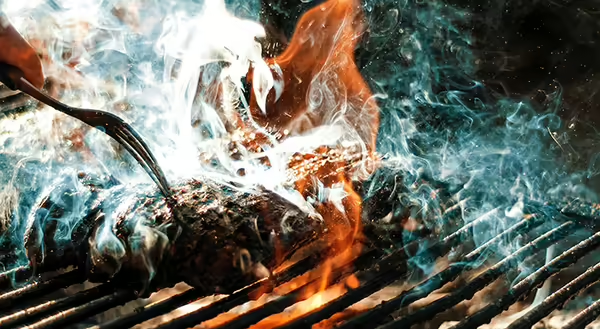
According the National Fire Protection Association (NFPA), between 2009 and 2013, local fire departments responded to an average of 8,900 home fires a year, involving grills, hibachis or barbecues. In addition to property damage, these fires also contributed to hundreds of injuries and an average of ten deaths each year.
The best way to prevent grill related injuries is to properly maintain your grill.
Gas Grills
Gas grills are a higher fire risk than charcoal grills. This is due in part to leaks and breaks in the gas hose or the gas cylinder. Thus it is important to do a safety check each year before using your grill, or every time you disconnect your cylinder or hose and regulator. Inspecting your grill thoroughly each time will help ensure there are no gas leaks.
Inspecting Your Gas Grill
Begin by mixing together a solution of dish soap and water, using a 50/50 solution of soap and water. Then after installing your gas cylinder, turn all gas controls to the off position. Once you have done this, open the gas cylinder valve one turn, in counter clockwise motion. Next lightly apply the soap mixture to the hose and all other gas connections.
If soapy bubbles begin to form, this is an indication there is a gas leak. Possible causes of leaks are as followed: improperly sealed connections, damage to the hose such as cracking, splitting or other damage caused by rodents. Additionally, you will want to pay close attention to the connection at the regulator, as this is an area that often becomes clogged in some gas grills.
If there is a leak, turn off the gas and do not attempt to grill. You can check the connections to see if they have become loose, if so tighten, and recheck using the soap-test. If the leak continues, contact a professional contractor to service your grill. Only professionally trained personnel should make modifications or alterations to the propane system. Attempting to fix the leak yourself may lead to potentially dangerous situations.
Cleaning Your Grill
A leading factor contributing to grill related fires was failure to clean the grill, according to the NFPA.
Thus contrary to popular belief that a seasoned grill provides the most flavor; it is important to clean grates, burners, side tables and the grease trap. Regular cleaning will not only help ensure grill safety, but it will also help the grill to performance at its best and extend the life of your grill.
Fat and grease buildup may lead to overheating of the grill components, melting of plastic dials and flexible hoses, warp metal, and crack ceramics. Furthermore, if the small holes that allow the gas to escape become clogged gas cannot escape, leading to an uneven distribution of flames.
Additionally, cleaning will help to prevent food from being contaminated by harmful foodborne related bacteria that may be lingering around, or from old grease. In warm weather, grease and oils quickly become rancid. This becomes an issue, as rancid grease on either the grill grates or the bottom of the grates can vaporize and give food an off flavor.
Always follow the manufactures instructions on how to properly clean your grill.
For more on grilling safety, check back later this week as we talk about food safety.
Today's post was written by Diane Reinhold, MPH, MS, RDN, is a registered dietitian and Nutrition & Wellness Educator serving Jo Daviess, Stephenson & Winnebago Counties. She specializes in chronic disease prevention, food preservation and worksite wellness.